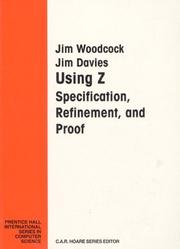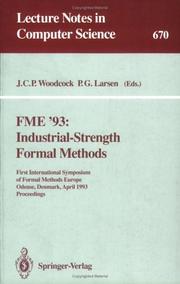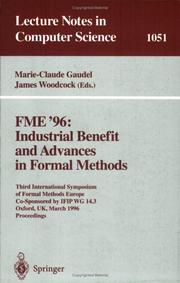| Listing 1 - 10 of 42 | << page >> |
Sort by
|

ISBN: 0139484728 9780139484728 Year: 1996 Publisher: Harlow Prentice Hall
Abstract | Keywords | Export | Availability | Bookmark
 Loading...
Loading...Choose an application
- Reference Manager
- EndNote
- RefWorks (Direct export to RefWorks)
Book
ISBN: 0273026739 9780273026730 Year: 1988 Publisher: London Pitman
Abstract | Keywords | Export | Availability | Bookmark
 Loading...
Loading...Choose an application
- Reference Manager
- EndNote
- RefWorks (Direct export to RefWorks)
Programming --- Computer science --- Computer programming --- Mathematics. --- Computer science - Mathematics.
Book
Abstract | Keywords | Export | Availability | Bookmark
 Loading...
Loading...Choose an application
- Reference Manager
- EndNote
- RefWorks (Direct export to RefWorks)
discrete structures --- Formal methods --- Predicate Calculus --- Software engineering
Digital
ISBN: 9783540691495 Year: 2008 Publisher: Berlin, Heidelberg Springer-Verlag Berlin Heidelberg
Abstract | Keywords | Export | Availability | Bookmark
 Loading...
Loading...Choose an application
- Reference Manager
- EndNote
- RefWorks (Direct export to RefWorks)

ISBN: 0387566627 3540566627 3540476237 Year: 1993 Volume: 670 Publisher: Berlin : Springer-Verlag,
Abstract | Keywords | Export | Availability | Bookmark
 Loading...
Loading...Choose an application
- Reference Manager
- EndNote
- RefWorks (Direct export to RefWorks)
The last few years have borne witness to a remarkable diversity of formal methods, with applications to sequential and concurrent software, to real-time and reactive systems, and to hardware design. In that time, many theoretical problems have been tackled and solved, and many continue to be worked upon. Yet it is by the suitability of their industrial application and the extent of their usage that formal methods will ultimately be judged. This volume presents the proceedings of the first international symposium of Formal Methods Europe, FME'93. The symposium focuses on the application of industrial-strength formal methods. Authors address the difficulties of scaling their techniques up to industrial-sized problems, and their suitability in the workplace, and discuss techniques that are formal (that is, they have a mathematical basis) and that are industrially applicable. The volume has four parts: - Invited lectures, containing a lecture by Cliff B. Jones and a lecture by Antonio Cau and Willem-Paul de Roever; - Industrial usage reports, containing 6 reports; - Papers, containing 32 selected and refereedpapers; - Tool descriptions, containing 11 descriptions.
Computer software --- Logiciels --- Development --- Congresses --- Développement --- Congrès --- Développement --- Congrès --- Computer software - Development - Congresses. --- Software engineering. --- Computer science. --- Logic design. --- Information technology. --- Software Engineering/Programming and Operating Systems. --- Computer Applications. --- Programming Techniques. --- Software Engineering. --- Logics and Meanings of Programs. --- IT in Business. --- IT (Information technology) --- Technology --- Telematics --- Information superhighway --- Knowledge management --- Design, Logic --- Design of logic systems --- Digital electronics --- Electronic circuit design --- Logic circuits --- Machine theory --- Switching theory --- Informatics --- Science --- Computer software engineering --- Engineering --- Congresses.

ISBN: 3540609733 3540497498 9783540609735 Year: 1996 Volume: 1051 Publisher: Berlin [etc.] : Springer-Verlag,
Abstract | Keywords | Export | Availability | Bookmark
 Loading...
Loading...Choose an application
- Reference Manager
- EndNote
- RefWorks (Direct export to RefWorks)
This book presents the refereed proceedings of the Third International Symposium of Formal Methods Europe, FME '96, held in Oxford, UK, in March 1996. FME '96 was co-sponsored by IFIP WG 14.3 and devoted to "the application and demonstrated industrial benefit of formal methods, their new horizons and strengthened foundations". The 35 full revised papers included were selected from a total of 103 submissions; also included are three invited papers. The book addresses all relevant aspects of formal methods, from the point of view of the industrial R & D professional as well as from the academic viewpoint, and impressively documents the significant progress in the use of formal methods for the solution of real-world problems.
Computer software --- Logiciels --- Development --- Congresses. --- Développement --- Congrès --- Développement --- Congrès --- Congresses --- Software engineering. --- Computer science. --- Logic design. --- Information technology. --- Software Engineering/Programming and Operating Systems. --- Programming Techniques. --- Software Engineering. --- Programming Languages, Compilers, Interpreters. --- Logics and Meanings of Programs. --- IT in Business. --- Design, Logic --- Design of logic systems --- Digital electronics --- Electronic circuit design --- Logic circuits --- Machine theory --- Switching theory --- Informatics --- Science --- IT (Information technology) --- Technology --- Telematics --- Information superhighway --- Knowledge management --- Computer software engineering --- Engineering --- Computer software - Development - Congresses
Book
ISBN: 3540691499 3540691472 Year: 2008 Publisher: Berlin : Springer,
Abstract | Keywords | Export | Availability | Bookmark
 Loading...
Loading...Choose an application
- Reference Manager
- EndNote
- RefWorks (Direct export to RefWorks)
This state-of-the-art survey is an outcome of the first IFIP TC 2/WG 2.3 working conference on Verified Software: Theories, Tools, Experiments, VSTTE 2005, held in Zurich, Switzerland, in October 2005. This was a historic event gathering many top international experts on systematic methods for specifying, building and verifying high-quality software. The book includes 32 revised full papers and 27 revised position papers, preceded by a general introduction to the area, which also presents the vision of a grand challenge project: the "verifying compiler". Most contributions are followed by a transcription of the vivid discussion that ensued between the author and the audience. The papers have been organized in topical sections on verification tools, guaranteeing correctness, software engineering aspects, verifying object-oriented programming, programming language and methodology aspects, components, static analysis, design, analysis and tools, as well as formal techniques.
Computer programs --- Verification --- Computer program files --- Files, Computer program --- Program files, Computer --- Programs, Computer --- Computer files --- Computer software --- Information Technology --- Computer Science (Hardware & Networks) --- Computer science. --- Software engineering. --- Logic design. --- Operating systems (Computers). --- Artificial intelligence. --- Programming Techniques. --- Software Engineering. --- Logics and Meanings of Programs. --- Programming Languages, Compilers, Interpreters. --- Operating Systems. --- Artificial Intelligence. --- AI (Artificial intelligence) --- Artificial thinking --- Electronic brains --- Intellectronics --- Intelligence, Artificial --- Intelligent machines --- Machine intelligence --- Thinking, Artificial --- Bionics --- Cognitive science --- Digital computer simulation --- Electronic data processing --- Logic machines --- Machine theory --- Self-organizing systems --- Simulation methods --- Fifth generation computers --- Neural computers --- Computer operating systems --- Computers --- Disk operating systems --- Systems software --- Design, Logic --- Design of logic systems --- Digital electronics --- Electronic circuit design --- Logic circuits --- Switching theory --- Computer software engineering --- Engineering --- Informatics --- Science --- Operating systems --- Computer programming. --- Computer logic. --- Programming languages (Electronic computers). --- Computer languages --- Computer program languages --- Computer programming languages --- Machine language --- Languages, Artificial --- Computer science logic --- Logic, Symbolic and mathematical --- Electronic computer programming --- Electronic digital computers --- Programming (Electronic computers) --- Coding theory --- Programming
Book
ISBN: 3540878734 3540878726 Year: 2008 Publisher: Berlin, Germany : Springer,
Abstract | Keywords | Export | Availability | Bookmark
 Loading...
Loading...Choose an application
- Reference Manager
- EndNote
- RefWorks (Direct export to RefWorks)
This volume contains the proceedings of the second working conference on Verified Software: Theories, Tools, and Experiments, VSTTE 2008, held in Toronto, Canada, in October 2008. The 16 papers presented together with 4 invited talks were carefully revised and selected for inclusion in the book. This second conference formally inaugurates the Verified Software Initiative (VSI), a fifteen-year, co-operative, international project directed at the scientific challenges of large-scale software verification. The scope of the cooperative effort includes the sharing and interoperability of tools, the alignment of theory and practice, the identification of challenge problems, the construction of benchmark suites, and the execution of large-scale experiments.
Computer programs --- Computer software --- Verification --- Quality control --- Computer program files --- Files, Computer program --- Program files, Computer --- Programs, Computer --- Computer files --- Software engineering. --- Computer science. --- Logic design. --- Software Engineering. --- Mathematical Logic and Formal Languages. --- Logics and Meanings of Programs. --- Programming Languages, Compilers, Interpreters. --- Programming Techniques. --- Models and Principles. --- Design, Logic --- Design of logic systems --- Digital electronics --- Electronic circuit design --- Logic circuits --- Machine theory --- Switching theory --- Informatics --- Science --- Computer software engineering --- Engineering --- Mathematical logic. --- Computer logic. --- Programming languages (Electronic computers). --- Computer programming. --- Computers. --- Automatic computers --- Automatic data processors --- Computer hardware --- Computing machines (Computers) --- Electronic brains --- Electronic calculating-machines --- Electronic computers --- Hardware, Computer --- Computer systems --- Cybernetics --- Calculators --- Cyberspace --- Computers --- Electronic computer programming --- Electronic data processing --- Electronic digital computers --- Programming (Electronic computers) --- Coding theory --- Computer languages --- Computer program languages --- Computer programming languages --- Machine language --- Languages, Artificial --- Computer science logic --- Logic, Symbolic and mathematical --- Algebra of logic --- Logic, Universal --- Mathematical logic --- Symbolic and mathematical logic --- Symbolic logic --- Mathematics --- Algebra, Abstract --- Metamathematics --- Set theory --- Syllogism --- Programming
Book
ISBN: 9783540752202 354075220X 3540752218 Year: 2007 Publisher: Berlin, Heidelberg : Springer Berlin Heidelberg : Imprint: Springer,
Abstract | Keywords | Export | Availability | Bookmark
 Loading...
Loading...Choose an application
- Reference Manager
- EndNote
- RefWorks (Direct export to RefWorks)
Formal methods (Computer science) --- Real-time data processing --- Méthodes formelles (Informatique) --- Temps réel --- Congresses. --- Congrès --- Björner, D. --- Zhou, Chaochen, --- Computer Science --- Engineering & Applied Sciences --- Information Technology --- Software Engineering --- Bjørner, D. --- Bjørner, Dines --- Bjørner, Dines, --- Chaochen, Zhou, --- Computer science. --- Computer organization. --- Software engineering. --- Computer logic. --- Mathematical logic. --- Computer Science. --- Software Engineering/Programming and Operating Systems. --- Software Engineering. --- Logics and Meanings of Programs. --- Computer Systems Organization and Communication Networks. --- Mathematical Logic and Formal Languages. --- Algebra of logic --- Logic, Universal --- Mathematical logic --- Symbolic and mathematical logic --- Symbolic logic --- Mathematics --- Algebra, Abstract --- Metamathematics --- Set theory --- Syllogism --- Computer science logic --- Logic, Symbolic and mathematical --- Computer software engineering --- Engineering --- Organization, Computer --- Electronic digital computers --- Informatics --- Science --- Logic design. --- Computer network architectures. --- Architectures, Computer network --- Network architectures, Computer --- Computer architecture --- Design, Logic --- Design of logic systems --- Digital electronics --- Electronic circuit design --- Logic circuits --- Machine theory --- Switching theory --- Chaochen, Zhou. --- Computer engineering. --- Computer networks. --- Machine theory. --- Computer Science Logic and Foundations of Programming. --- Computer Engineering and Networks. --- Formal Languages and Automata Theory. --- Abstract automata --- Abstract machines --- Automata --- Mathematical machine theory --- Algorithms --- Recursive functions --- Robotics --- Communication systems, Computer --- Computer communication systems --- Data networks, Computer --- ECNs (Electronic communication networks) --- Electronic communication networks --- Networks, Computer --- Teleprocessing networks --- Data transmission systems --- Digital communications --- Electronic systems --- Information networks --- Telecommunication --- Cyberinfrastructure --- Electronic data processing --- Network computers --- Computers --- Distributed processing --- Design and construction
Book
ISBN: 3642397204 3642397212 Year: 2013 Publisher: Berlin, Heidelberg : Springer Berlin Heidelberg : Imprint: Springer,
Abstract | Keywords | Export | Availability | Bookmark
 Loading...
Loading...Choose an application
- Reference Manager
- EndNote
- RefWorks (Direct export to RefWorks)
This book presents 5 tutorial lectures by leading researchers given at the ICTAC 2013 Software Engineering School on Unifying Theories of Programming and Formal Engineering Methods, held in Shanghai, China in August 2013.The lectures are aimed at postgraduate students, researchers, academics, and industrial engineers. They cover topics such as component-based and service-oriented systems, real-time systems, hybrid systems, cyber physical systems, and present techniques such as inductive theorem proving, model checking, correction by construction through refinement and model transformations, synthesis, and computer algebra. Two of the courses are explicitly related to Hoare and He's Unifying Theories of Programming.
Engineering & Applied Sciences --- Computer Science --- Computer science. --- Software engineering. --- Computers. --- Artificial intelligence. --- Computer Science. --- Theory of Computation. --- Software Engineering. --- Artificial Intelligence (incl. Robotics). --- Software engineering --- Systems engineering --- Computer programming --- Coding theory --- Data processing --- Engineering systems --- System engineering --- Engineering --- Industrial engineering --- System analysis --- Design and construction --- Information theory. --- Artificial Intelligence. --- AI (Artificial intelligence) --- Artificial thinking --- Electronic brains --- Intellectronics --- Intelligence, Artificial --- Intelligent machines --- Machine intelligence --- Thinking, Artificial --- Bionics --- Cognitive science --- Digital computer simulation --- Electronic data processing --- Logic machines --- Machine theory --- Self-organizing systems --- Simulation methods --- Fifth generation computers --- Neural computers --- Computer software engineering --- Communication theory --- Communication --- Cybernetics --- Automatic computers --- Automatic data processors --- Computer hardware --- Computing machines (Computers) --- Electronic calculating-machines --- Electronic computers --- Hardware, Computer --- Computer systems --- Calculators --- Cyberspace --- Informatics --- Science
| Listing 1 - 10 of 42 | << page >> |
Sort by
|

 Search
Search Feedback
Feedback About UniCat
About UniCat  Help
Help News
News